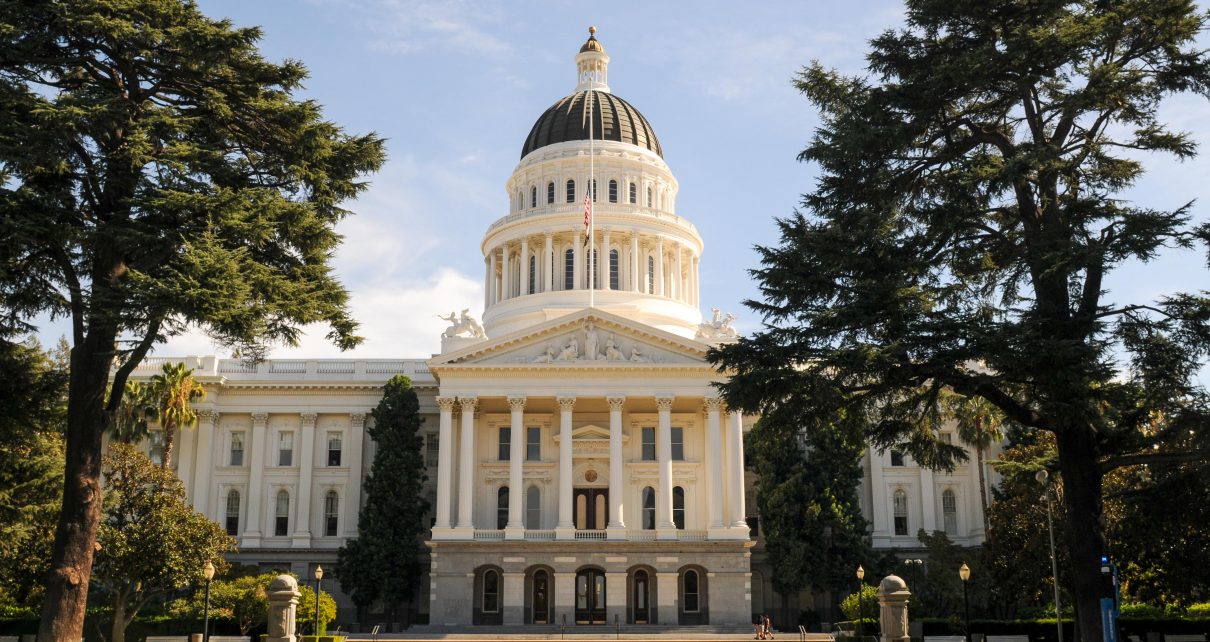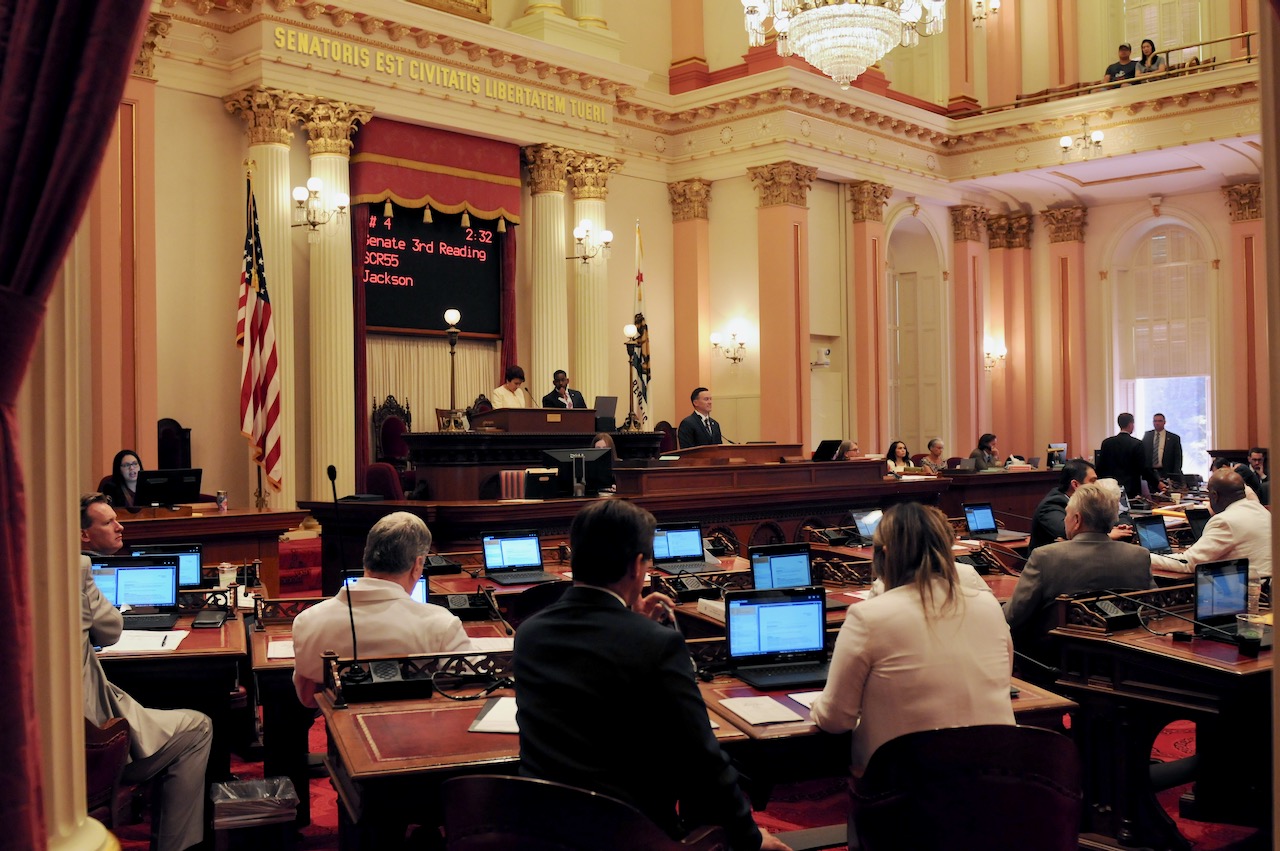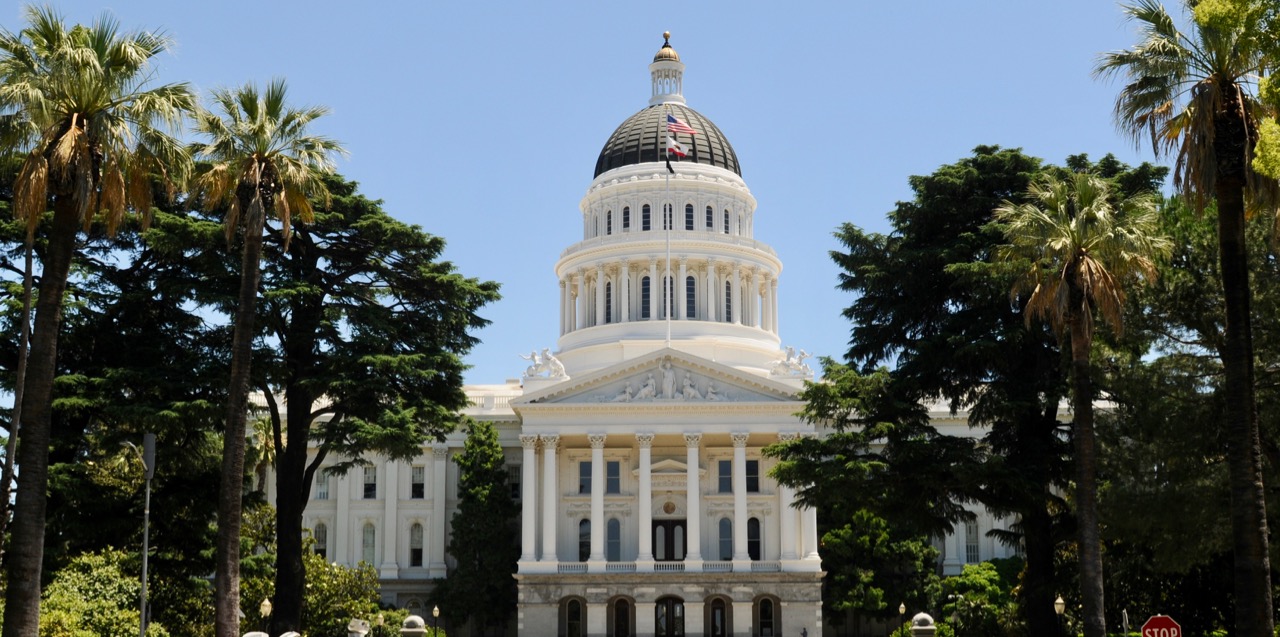
California State Capitol. (Photo: Kevin Sanders for California Globe)
Yay for Bad Government!
Unless…
By Thomas Buckley, November 19, 2023 3:00 am

Government (and many private) bureaucracies are where hope goes to die.
Populated by slothful, uncaring time servers who literally have no motivation to do much more than physically (and now not even that) show up, sit down, and look plausible (if that is at all possible,) the rather dour reputation of any bureaucracy is well deserved.
But sometimes – just sometimes – that can actually be a good thing.
Take, for example, California’s State Water Resources Control Board. In January, the board unanimously approved a Racial Equity Action Plan. The plan called for a number of actions – hey, that’s in the name! – to be taken by the Board and its staff to make absolutely sure that the water that is piped to your farm, business, or home is not bringing California’s systemic racism along with it.
When approved, Greg Gearhart, Deputy Director, Office of Information Management and Analysis, said it will help alleviate the clear current connection between “pollution and prejudice,”
One of those actions was called “community capacity building.” CCP (Remind you of anything? Sorry, couldn’t resist) involves a number of concepts, but, as envisioned in the bill sponsored by Assembly Speaker Robert Rivas (D-Salinas) it was specifically expected that the Board “establish a community capacity-building stipend program to promote meaningful civic engagement by disadvantaged communities and tribal communities in the state board and regional board decision making processes, among other activities” by “providing funding or services that allow members of the public to overcome barriers, such as technology, language, travel, and income, to public participation.”
In other words, the Board decided to pay members of the public to show up at Board meetings and other water-related activities statewide.
How this would work (and how it is not an illegal gift of public funds) was not spelled out in January. As noted at the time, the Globe wondered whether:
- What counts as feedback – can a person just call the switchboard and complain about something and get paid?
- Can anyone just walk into a board meeting, sign in, and get paid or do they have to say something?
- Will only pre-approved stakeholders/activists qualify for payment and who decides who they are?
- How will tax issues be handled if no pre-approval (i.e. obtaining things like Social Security numbers) exists?
- Are one-on-one meetings covered?
- How will “disadvantaged” be defined – by race, by income, by living in a place with a shaky water system, etc.?
- Can an activist group (by the way in California there are dozens of water-related pressure groups) simply fill up a bus with random people, drive them to a workshop, and get everyone paid while simultaneously being able to say “look how important this is to the public – do what we want!”?
These questions have yet to be answered, in large part – thankfully – because the Board and its staff haven’t bothered to ask them during the past ten months.
The Rivas bill said the Board “shall” do certain things, but some of those actions, like the stipend program and hiring some new staff (surprise!) were “(C)ontingent upon an appropriation…”
The Speaker’s office did not respond to a request for comment.
The state budget process is rather byzantine, but in cases like this (in a very nutshell) the agency in question typically has to ask for the “contingent upon appropriation” money, unless the sponsor of the bill is really gung-ho about it and works on it themselves.
There could be a “trailer bill” to provide the cash, it could be line-itemed in the Governor’s annual proposal, or – more likely – the SWRCB would submit a “BCP,” or budget change proposal. These are created by the agency, which then tries to get the okay from the Department of Finance and the Governor’s Office. If it passes the smell test, the BCP is then considered during one of the “budget revises” that occurs about mid-fiscal year (January, 2024 is the next one) or towards the end.
A BCP must include not only a budget but also a detailed description of what the money is for and how it will be used. In other words, an agency can’t ask for money until it has figured out how to spend it.
And the SWRCB has not asked for the money, has not submitted a BCP, and – implied at least in an email exchange with its communications office – isn’t even in a position to do so because it seems it hasn’t defined the program parameters.
When asked about the progress of the effort, a SWRCB communications officer wrote the following in an email:
“As you know by reading the bill language the funds for that program are subject to appropriation by the Legislature. It’s a discretionary program, meaning that the program would be funded if funds are available in the Budget. The questions you ask are likely best put for when the Legislature allocates those funds to us, as none of the programs can be created until that happens. The Legislature has not set an appropriation aside for that program and did not do so in this year’s budget.”
When asked to clarify, the comms human wrote:
“Like I said, it’s all contingent on appropriation by the Legislature. If, and when, that happens-please reach out.”
And when asked if the SWRCB had even sought the funding and/or worked internally on figuring out how the program would work (again, something they would have to do before asking) there was no reply either from the communications office or Board chair Joaquin Esquivel.
So it appears the entire concept is stuck in the cubiclized netherworld of the SWRCB – and that in and of itself is probably a good thing.
That brings us to the next question – why?
Why has this much-touted idea gone nowhere?
There are a number of possibilities. First, there is the chance that everyone involved realized its completely unworkable and unethical and stupid and/or illegal/unconstitutional so they just dropped it.
Considering the other things the state does that cozy up to and/or cross those lines of propriety, that reason is highly unlikely.
Second, there is the massive budget deficit the state faces, meaning ancillary programs that have yet to be funded are very unlikely to get their initial funding (most existing silly programs continue to be funded; it’s getting in the money door that is – for now – the hard part.)
That is quite possible; the SWRCB staff could have realized there was no prayer of funding so they didn’t ask. However, that does obviate the requirement to figure out (don’t need extra money to do that) internally what exactly the program will entail so while possible it still shows the board and staff either as having an, um, lackadaisical in their approach or really not caring too much about the program.
And that is the third possibility – not caring.
Much of government is performative, with officials standing up in public, saying something they think will be popular, getting a little more electoral support, and giving residents a tiny little endorphin rush as they imagine the wonders of a future to be made better by the new program.
The officials then wander off to the next shiny object and the public eventually forgets what they were promised or they assuage their concerns by understanding that “Rome wasn’t built in a day.”
Hence high speed rail, though that does come with the added bonus of being able to funnel billions of dollars to political friends and the Sacramento blob of bureaucrats, lobbyists, and hacks to make sure they let you, the elected official, continue to exist.
And a program that literally would pay people to interact with the government is a very bright very shiny thing indeed.
This answer comes with another key benefit, though it does take the “not” out of caring – the creation of a tether. Beyond calling for people to be given money, it also calls for grifty non-profits and sleazy foundations and one-trick advocacy groups – sorry, “the multi-cultural stakeholders whose diverse opinions need to play a crucial role in creating a resilient, sustainable, and equitable water system that will benefit all Californians for years to come” – to be funded directly and/or be used as a pass through so that they can pay people themselves.
This support of “non-governmental organizations” that have an interest in any particular issue is occurring right now across the California government. Agencies regularly give money to “community activists” to build “third party validation” support for whatever they propose. To wit:
“Third party validators remove – or at least distance – the stink of a terrible or dangerous or illegal proposal or project or plan from the proponent. And they are very convenient things for the media to use when they try to be “fair” but want to make sure the reader clearly understands on which side of an issue they – like the great and good of the world – should be (reporters can control content by asking only certain groups that they already know will respond in the way they like and/or need.)”
By keeping these people and groups on the hook with the promise of potential future money, agencies like the SWRCB essentially cripple their ability or desire to say anything bad about the SWRCB or any of its programs, lest they be left out when the money does appear.
And that’s a very good thing to – for the bureaucracy, at least.
Drip, drip, drip…
Note – the “the multi-cultural stakeholders whose diverse opinions need to play a crucial role in creating a resilient, sustainable, and equitable water system that will benefit all Californians for years to come” quotation is not an actual quotation from any SWRCB document (I think,) but merely an example of govspeak that can be modified as needed for any topic – just replace “water system” with literally anything else.
- ADA Diana Teran Booked, Los Angeles DA Gascon Faces Another Complaint - April 28, 2024
- Curiouser and Curiouser: Gascon’s Aide Charges Raise Troubling Issues - April 27, 2024
- Reedley ‘Lab’ Prompts Legislation - April 26, 2024




